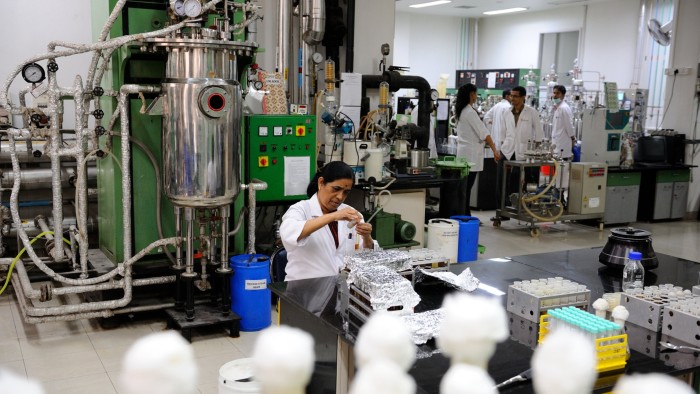Stay informed with free updates
Simply sign up to the Pharmaceuticals sector myFT Digest — delivered directly to your inbox.
The generic drug industry has warned that US tariffs on pharmaceuticals risk causing shortages of medicines including cancer treatments, and that manufacturers might stop making products that become unprofitable as a result.
Generic medicines, which are cheaper versions of drugs that no longer have patent protection, make up about 90 per cent of US drug supply. The majority are manufactured outside the US, in lower-cost countries such as India. The active ingredients used in the products often come from China.
So far, pharmaceuticals have avoided the wide-ranging new US tariffs. But President Donald Trump has repeatedly said he plans to apply them to the sector, and the US commerce department this week has said it is investigating the national security implications of pharmaceutical imports.
The department has up to nine months to publish its conclusions but commerce secretary Howard Lutnick said tariffs could happen sooner, in the “next month or two”.
John Murphy, chief executive of the Association for Accessible Medicines, a US lobby group, said tariffs would not benefit patients or improve the security of the healthcare system. He said older injectables, such as chemotherapy for cancer, were “particularly vulnerable”.
“For those generics already sold at a very narrow margin, you could see a situation where it becomes financially infeasible for certain products to be brought to market if they are going to lose money,” he said.
Murphy said he was lobbying the White House for the industry to be treated differently, arguing that there were other ways to encourage more onshoring of production, and that imposing costs on an industry that was already struggling with capital investment would not work.
“Where does the capital come from to shift production if we’re already at barely the cost of goods? . . . And potentially underwater in the short term because of tariffs,” he added.
The US healthcare system already struggles with supplies for some particularly low-margin products: the number of active drug shortages hit an all-time high of 323 in the first quarter of last year, according to the American Society of Health-System Pharmacists, the largest association of pharmacy professionals in the US.
Mark Samuels, chief executive of the British Generic Manufacturers Association, said the costs of tariffs would be difficult to absorb because fierce competition meant prices were already “significantly constrained” and so there would be “potential for more shortages”.
India would be particularly badly hit by pharmaceutical tariffs. It has a 20 per cent share of the global export of generic drugs and a 60 per cent share in the supply of low-cost vaccines, according to the Indian Pharmaceutical Alliance.
Some in the industry say US tariffs could drive some Indian manufacturers out of business.
“Indian pharma products will become more expensive in the US market which may result in substantial loss in market share for our Indian pharma companies,” B Partha Saradhi Reddy, chair of generic company Hetero and an MP in India’s upper house, said in March.
This could reduce the profit margins for low-cost generic medicines, making them uncompetitive and “not viable” for the companies making them, he said.
Recommended
Premier, a group purchasing organisation that buys drugs for more than 4,000 US hospitals, said there could be an increase in shortages. But it said its three-year contracts meant generic manufacturers were locked into prices, adding they often include provisions that drugmakers who fail to supply have to cover the cost of buying alternatives.
Tariffs are also likely to drive up prices for consumers. Dutch bank ING estimates that a 24-week prescription for a generic cancer drug could cost $8,000 to $10,000 more if 25 per cent tariffs are imposed.
Stephen Farrelly, global head of pharma and healthcare at ING, said the people who would be “hardest hit” were those without insurance, who paid for their own drugs, though people with health insurance could face higher premiums down the line.
Prashant Reddy, co-author of The Truth Pill, a book about India’s pharma industry, said the US often had little choice but to buy from India. “A lot of these drugs are not made anywhere else. They are shooting themselves in the foot because it’s just going to raise prices in the US,” he said.



